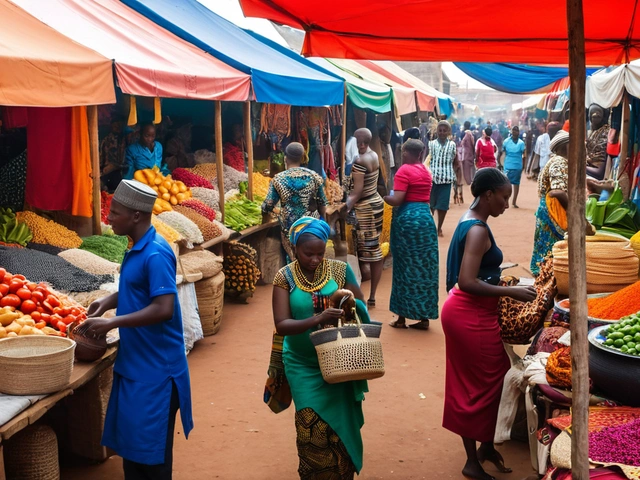When it comes to earning potential, pharmacists often ask where they can find the highest salaries in the world. Several factors play a big role, from the country's healthcare system to the demand for pharmaceutical services.
In this article, we'll dive into the countries offering the most lucrative salaries for pharmacists. We'll discuss what makes these places stand out and what you need to consider if you plan to work abroad. Whether you're an experienced pharmacist or just starting, this information could guide you to a rewarding career choice.
- Introduction to Pharmacist Salaries
- Top Paying Countries
- Factors Influencing Salaries
- Cost of Living Considerations
- Tips for Pharmacies Seeking High Salaries
Introduction to Pharmacist Salaries
Pharmacists are essential pillars in the healthcare system, playing a crucial role in patient care through the safe dispensation of medications and providing counsel on their use. The compensation for pharmacists varies widely across the globe, influenced by factors such as education, certification requirements, and the economic status of the country.
In the United States, for example, pharmacists are among the highest-paid professionals within the healthcare sector. According to the Bureau of Labor Statistics, the median annual wage for pharmacists was around $128,090 in 2023. This high salary can be attributed to the rigorous educational requirements and the growing demand for healthcare services. On the other hand, countries like Switzerland and Canada also offer competitive salaries due to their advanced healthcare systems and the importance they place on pharmaceutical care.
Interestingly, the salary dynamics for pharmacists aren't merely a factor of educational attainment and job responsibilities. Governments and private healthcare institutions in various countries also play a big role. For instance, in Qatar and the UAE, the demand for pharmacists has surged, leading to higher-than-average salaries to attract the best talent from around the world. Moreover, economic factors such as inflation rates and cost of living also greatly affect pharmacists' take-home pay.
Indeed, location is key when it comes to salary variance. While pharmacists in the U.S. or Switzerland enjoy some of the highest wages globally, their counterparts in developing countries often earn significantly less despite having similar qualifications. However, in many places, efforts are underway to improve wages and working conditions for pharmacists.
It's also worth noting that pharmacists in high-paying countries often have advanced roles, including participating in clinical decisions, managing medication therapy, and educating patients on disease prevention. These responsibilities require higher levels of expertise and skills, justifying the better compensation.
So, what exactly drives these variations in pharmacist salaries? It's a combination of demand and supply dynamics, government policies, healthcare infrastructure, and societal valuation of the pharmaceutical profession. Each of these elements can significantly skew salary statistics from one region to another. This discussion sets the stage for exploring where pharmacists can find the most lucrative jobs around the world.
"Pharmacists are an essential component of healthcare. Their expertise not only ensures the proper use of medication but also plays a critical role in disease management and patient education." - American Pharmacists Association
As you dig deeper into the landscapes of pharmacist salaries around the world, it's essential to keep in mind that each country offers unique opportunities and challenges. Whether you're considering a move for improved pay or looking for a fresh start in a new culture, understanding these differences will position you to make informed career decisions.
Top Paying Countries
Pharmacists looking to maximize their earning potential often find that certain countries offer significantly higher salaries than others. The factors behind these differences range from economic conditions to national healthcare policies.
Switzerland stands out as one of the top-paying countries for pharmacists. Thanks to its advanced healthcare system and high cost of living, pharmacists in Switzerland can expect to earn substantial salaries. On average, a pharmacist in Switzerland can pull in around $160,000 annually. The country’s strong economy and emphasis on healthcare quality drive these numbers. However, it’s important to remember that the cost of living in Swiss cities like Zurich and Geneva can be quite high.
The United States also ranks high on the list. Pharmacists in the U.S. earn an average of $120,000 per year, with those in specialized fields or with significant experience earning much more. States like California and Alaska offer some of the highest salaries due to the strong demand for healthcare professionals and the high cost of living. The U.S. also provides a range of opportunities for career advancement, which can be a big draw.
According to the American Association of Colleges of Pharmacy, "The demand for pharmacists in the U.S. is expected to grow, driven by an aging population and increased access to healthcare services."
In Australia, pharmacists can expect to earn around $90,000 annually. The country's healthcare system is well-regarded, and there is a steady demand for pharmacy services. Cities like Sydney and Melbourne offer lucrative job opportunities, though the cost of living is also high. Australia’s friendly immigration policies make it an attractive destination for foreign pharmacists looking to work abroad.
Another top-paying country is Canada. Pharmacists in Canada earn an average of $95,000 per year. Provinces like Ontario and British Columbia offer the most competitive salaries. Canada’s public healthcare system ensures a steady demand for pharmacy professionals, and the country’s high standard of living makes it an appealing option.
Last but not least, Germany is known for its generous salaries for pharmacists. The average annual salary for a pharmacist in Germany is around $85,000. Germany’s healthcare system is one of the most efficient in the world, driving the demand for qualified pharmacists. Cities like Berlin and Munich offer excellent job opportunities but come with varying living expenses.

Factors Influencing Salaries
Understanding why salaries for pharmacists vary across the globe requires a closer look at several key factors. One of the most critical determinants is the country's healthcare infrastructure. In nations where healthcare is a priority, pharmacists often receive higher compensation. For instance, countries with well-funded public healthcare systems like Switzerland and the United States tend to offer substantial pay packages to their pharmacists.
Another significant factor is the cost of living in a particular region. High-paying countries like Australia and Norway also come with steep living expenses. Balancing salary against the cost of living is crucial. For example, while you might earn a high salary working in urban centers like Sydney or Oslo, housing, commuting, and other essential living costs can significantly affect your disposable income.
Demand and supply dynamics within the pharmaceutical sector also play a vital role. Countries experiencing a shortage of skilled pharmacists, such as Canada, often provide incentives, including high salaries, to attract talent. This market-driven approach ensures that pharmacists are available to meet the population's needs.
Educational requirements and professional qualifications are additional aspects affecting salary scales. Regions that mandate advanced certifications or extensive training typically offer higher wages to compensate for the longer educational trajectory. For example, in the United States, the requirement for a Doctor of Pharmacy (Pharm.D.) degree tends to elevate the salary bracket in comparison to countries where less qualifying education is needed.
Workload and job responsibilities can differ considerably, which influences pay rates. In some countries, pharmacists might have additional roles such as administering vaccines or providing clinical consultations, which merit higher salaries. Conversely, places where pharmacists have more limited responsibilities may offer lower wages.
Government policies and legislation can also heavily influence pharmacist salaries. Health regulations, minimum wage laws, and union activity often vary and can significantly impact salary structures. In countries where the pharmaceutical sector is strongly regulated, such as Germany, wages may be more standardized.
"Compensation structures for pharmacists are complex and are influenced by multiple legislative and economic factors," explains Dr. Jane Smith, a healthcare economist. "Understanding these factors can help professionals make informed career decisions."
Finally, experience and specialization within the field greatly affect earning potential. Specialized pharmacists, including those focused on oncology, cardiology, or infectious diseases, generally command higher salaries due to their niche expertise and the critical nature of their responsibilities. Moreover, years of experience add value to the pharmacist's role, often leading to higher income due to the depth of their practice knowledge.
Cost of Living Considerations
When looking at the highest salaries for pharmacists around the globe, the cost of living in these locations is something you cannot overlook. While some countries offer top-notch salaries, the expenses associated with living there can significantly impact how much you can save. For instance, pharmacists in Switzerland often report some of the highest earnings. However, the cost of everyday items, from rent to groceries, is among the most expensive in the world.
Imagine living in Zurich, where a two-bedroom apartment could set you back nearly $3,500 a month. That’s quite a dent in your paycheck, even if you are earning a substantial salary. On the other hand, pharmacists in countries like Australia also enjoy handsome salaries. Yet, cities like Sydney or Melbourne can be expensive to live in as well, making it crucial to account for housing, transportation, and other living expenses when evaluating these offers.
Let's take a look at another example–the United States. While pharmacists in states such as California or New York make impressive sums, the cost of living in cities like Los Angeles or New York City is notoriously high. According to the U.S. Census Bureau, the median rent in these cities exceeds $2,000 a month. Therefore, aspiring pharmacists should do their homework about the local cost of living before relocating.
According to Mercer’s Cost of Living Survey, “Hong Kong is consistently ranked as one of the most expensive cities, but it also offers high salaries for pharmacists.”This balance of high income and high living costs paints an intricate picture for professionals hoping to maximize their savings.
Countries like Japan and Singapore also offer substantial salaries for pharmacists, but the cost of living is a factor that requires close examination. In Tokyo, the vibrant capital of Japan, both rent and food costs can be quite high. The same can be said for Singapore, where living expenses are among the highest in Asia.
Interestingly, some regions provide an attractive balance. For example, pharmacists in Germany earn relatively high wages while enjoying a cost of living that is more manageable, especially outside major cities like Berlin or Munich. This makes Germany a popular choice among expatriate professionals.
Another intriguing option is Canada. Cities like Toronto and Vancouver have high living costs, but other areas provide a good quality of life at a more affordable rate. Moreover, the healthcare system in Canada is considered one of the best, offering additional benefits besides just the salary.
When contemplating a move for a higher salary, always factor in the cost of living. The goal is to find a sweet spot where your earnings give you a better lifestyle and the ability to save. Research thoroughly and compare the expenses associated with daily life in these high-paying countries to make an informed decision.

Tips for Pharmacies Seeking High Salaries
If you're a pharmacist looking for a high-paying job, it’s essential to put in the groundwork. The following tips can help you find those lucrative positions and make your career both challenging and rewarding.
Knowing which countries offer the best salaries is a key step. Places like the United States, Switzerland, and Canada consistently rank high for pharmacist pay. Researching each country's healthcare system, employment demand, and living conditions will provide a clearer picture. For instance, the average salary for a pharmacist in the United States can exceed $120,000 annually, making it a prime destination.
Alicia Ouellette, a well-known health economics expert, says, “An increasing demand for health care and pharmaceutical services in aging populations is driving up the need for skilled pharmacists, which naturally increases the compensation packages offered to attract top talent.”
Educational credentials play a vital role too. Some countries like Germany or Australia may require additional certifications or proof of your qualifications. Ensuring you have the right paperwork and meeting any additional educational requirements can open doors to higher pay. Networking within professional circles and joining international pharmacy organizations can also give you an edge. These groups often provide job listings, certification programs, and professional advice tailored to pharmacists seeking opportunities abroad.
It is important to factor in the cost of living when considering a high salary. Countries with higher pay might also have a higher cost of living. The high salary in Switzerland balances with its expensive lifestyle. A useful tip is to calculate your potential savings after living expenses. Comparing these figures across different countries will help you make an informed decision.
Keeping an eye on job market trends can also be beneficial. The healthcare industry is dynamic, and a country that offers the highest salaries today might not do so in the future. Regularly checking job portals, subscribing to industry newsletters, and connecting with recruitment agencies specializing in healthcare can provide updated information.
Your negotiation skills shouldn't be underestimated. Once you land a job offer, don’t hesitate to negotiate your salary and benefits package. Employers may offer relocation assistance, housing allowances, or performance bonuses in addition to the base salary. These extras can significantly improve your overall compensation.
Consider locations where pharmacists are in short supply. Rural or underserved areas often provide better salaries and benefits to attract professionals. While these areas might lack the glamor of big cities, they can offer more practical experience and community engagement, enhancing your career in the long run.
Gaining work experience in countries renowned for their healthcare systems can give you a competitive advantage. Working in places like the UK or Japan not only comes with a good income but also boosts your resume. Potential employers often regard international experience favorably, giving you a leg up when applying for future positions.
Lastly, get knowledgeable about visa and immigration laws pertinent to your profession. Each country has its own set of rules and understanding them beforehand can prevent complications that might impact your employment. Consulting with an immigration expert can provide clarity on the process and requirements.

 Understanding the High Unemployment Rate in Ethiopia: Causes and Solutions
Understanding the High Unemployment Rate in Ethiopia: Causes and Solutions
 Top Selling Products in Africa: What’s Hot in the Market?
Top Selling Products in Africa: What’s Hot in the Market?
 Pharmacist Salary in the USA: What You Need to Know
Pharmacist Salary in the USA: What You Need to Know
 Top 3 Religions in Ethiopia: Insights into Faith and Culture
Top 3 Religions in Ethiopia: Insights into Faith and Culture
 Top Online Businesses Thriving in Ethiopia 2024
Top Online Businesses Thriving in Ethiopia 2024
Larry Keaton
July 19, 2024 AT 17:38Listen up, if you're thinkin about chasing the biggest pharmacist paycheck you gotta get real about the market dynamics. The US still throws down one of the fattest salary packs, especially if you lock in a Pharm.D. and chase a clinical specialist role. Dont expect a golden ticket just by showing up with a degree, you need to hustle in high‑cost states like California or Alaska where hospitals actually compete for talent. The cost of living there can eat half your raise, but the net still beats most places if you budget right. You also gotta factor in that many top‑paying countries demand extra certifications, and that paperwork can be a nightmare if you aren't prepared. Switzerland, for example, boasts insane salaries but demands fluency in local regulations and often a Swiss work permit-nothing for the faint‑hearted. Canada offers a decent middle ground, but the provincial licensing hoops will chew up weeks of your time. Australia dazzles with a good work‑life balance, yet the salary boost there is offset by sky‑high housing in Sydney. If you want the biggest numbers, consider diving into the niche fields like oncology or pharmacogenomics, where the pay jumps like a rocket. Experience counts too; after five years you can negotiate bonuses that can double your base. Networking with the right professional groups can land you contract gigs that pay per hour, which often outshine static salaries. Dont forget to leverage relocation packages, many big pharma firms will foot your moving costs and even throw in temporary housing. The key is to treat your career move like a strategic investment, not just a vacation. So stop whining about low pay and start putting the work into getting the credentials, the connections, and the courage to move where the money flows. Remember, the highest salaries go to those who are willing to adapt, relocate, and keep their skills razor‑sharp.
Liliana Carranza
July 25, 2024 AT 23:38Hey fellow pharmacy warriors! 🌟 If you crave a career that feels like a thrilling adventure, chase those high‑paying markets while keeping your heart in patient care. Picture yourself strolling the Zurich streets, coffee in hand, while your paycheck mirrors that vibe. Remember, the journey is just as important as the destination, so soak up the culture, learn the language, and let every new city fuel your passion. Your skills are your passport-pack them wisely and set sail for the brightest horizons!
Jeff Byrd
August 1, 2024 AT 05:38Oh great, another list of places to spend even more on rent.
Joel Watson
August 7, 2024 AT 11:38While the enthusiasm is evident, one must consider the nuanced economic variables that influence remuneration. The marginal utility of salary increments diminishes when juxtaposed with escalated living expenses. Moreover, professional licensure reciprocity across jurisdictions often imposes additional bureaucratic layers. Consequently, strategic career planning should integrate both fiscal and regulatory dimensions to optimize long‑term satisfaction.
Chirag P
August 13, 2024 AT 17:38Absolutely, the data is clear: countries investing heavily in healthcare infrastructure tend to reward pharmacists accordingly. It is essential, however, to respect local customs while asserting one’s professional worth. By aligning credentials with national standards, one can navigate the transition smoothly and secure a competitive package.
RUBEN INGA NUÑEZ
August 19, 2024 AT 23:38For anyone weighing options, remember that salary is just one piece of the puzzle. Evaluate the comprehensive benefits, professional development opportunities, and work‑life balance each nation offers. A well‑rounded package often outweighs a marginally higher base pay.
Michelle Warren
August 26, 2024 AT 05:38yeah but thecost of living in some places is insane i mean like you cant live on a normal wage there lol
Christopher Boles
September 1, 2024 AT 11:38If you're planning a move, start by checking the licensing requirements early. Some regions require additional exams or certifications even if you have extensive experience. Doing this research now can save you months of frustration later.
Crystal Novotny
September 7, 2024 AT 17:38Licensing rules differ widely across borders
Reagan Traphagen
September 13, 2024 AT 23:38Everyone forgets that big pharma companies are secretly funneling funds to shape drug policies, which inflates salaries to keep the status quo. The higher pay you see is less about skill and more about buying loyalty. So before you chase that shiny paycheck, ask who’s really pulling the strings. The truth is buried under layers of PR and lobbyists.
mark sweeney
September 20, 2024 AT 05:38Sure, but even if the industry has issues, the salary numbers are real and can improve personal life. Avoiding all pharma jobs because of conspiracies might cost you financially.
randy mcgrath
September 26, 2024 AT 11:38Considering the philosophical side, the pursuit of a higher salary often mirrors the quest for personal fulfillment. Yet true contentment may stem from the impact you have on patient health rather than the size of your paycheck. Balance is key.
Frankie Mobley
October 2, 2024 AT 17:38Exactly, focusing on both professional growth and well‑being leads to a satisfying career wherever you choose to work.